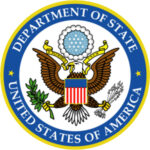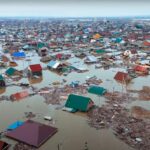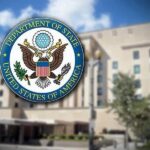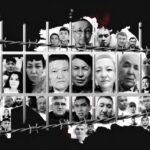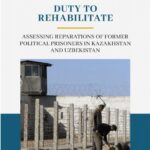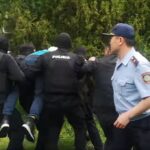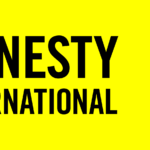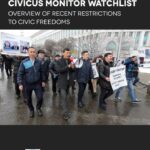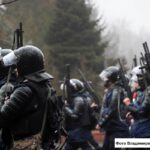
Kazakhstan Unrest:
The Authorities Should Ensure a Thorough and Impartial Investigation, Uphold Human Rights
20 December 2011. International Partnership for Human Rights (IPHR) supports the appeal made by Kazakhstani human rights organizations for a transparent, thorough and impartial investigation of the unrest that swept western Kazakhstan starting last Friday. It also calls on the authorities of Kazakhstan to ensure that all measures taken in response to the unrest are consistent with international human rights standards, as well as to re-examine their policies toward the region’s striking oil workers, who have faced repression when seeking to promote their rights and interests in peaceful ways.
The unrest broke out on 16 December at the central square in the city of Zhanaozen, where striking oil workers have been protesting peacefully since the summer to demand fair pay and work conditions, as well as an end to restrictions on trade union activities. Video clips posted on the internet showed young men storming a stage on the square where celebrations were under way to mark Kazakhstan’s 20 years independence anniversary, and others destroying a bus and burning a large holiday tree. Subsequently a number of buildings were set on fire, other acts of vandalism and looting were reportedly carried out, and violent clashes with police took place. According to official information from 18 December, 14 people died (including a 16-year-old boy and a 37-year old woman) and over 80 were wounded (among whom there are police officers). Unofficial sources have reported considerably higher figures of casualties and injuries.
In a separate incident in the town of Shetpe, which is located some 150 km from Zhanozen, violent clashes took place on 17 December after a group of people blocked railway tracks, apparently in support of protesters in Zhanaozen. According to official figures, 12 people were wounded, one of whom later died.
In a public statement about the developments in the Mangistau region, Kazakhstani President Nazarbaev instructed law enforcement authorities to thoroughly investigate what happened, be open about the results and, if necessary, engage independent experts. IPHR welcomes this announcement and joins its partner organization Kazakhstan International Bureau for Human Rights and Rule of Law and other Kazakhstani human rights NGOs in calling for the investigation to be carried out in a truly transparent and impartial manner and with the objective of getting a full picture of all aspects of the events. IPHR emphasizes the importance of allowing civil society to contribute to establishing the truth about the unrest, both as part of the official investigation and separately.
While government officials have accused ”bandits” and “hooligans” of orchestrating the unrest and fomenting striking workers to participate, it remains unclear how the clashes got started, with what motives those involved acted, and what role striking workers played in them. Another open question is the use of force by law enforcement authorities. On Sunday Kazakhstani Interior Minister Kalmukhambet Kasymov acknowledged that police opened fire during the clashes in Zhanaozen. He said that they did so because they found themselves in a critical situation where they “did not have any other choice” and that they fired primarily in the air and on the ground. He noted that some people may have been killed by ricocheting bullets. According to media reports, however, eye witnesses have been telling about shootings targeting unarmed civilians who were present when the unrest broke out. While unconfirmed, these allegations are serious and disturbing and must be investigated. Under international standards, law enforcement officials should use force only as a last resort, when other means have been ineffective. When they do so, they must exercise restraint, ensure that their actions are proportionate to the existing threat and do all they can to minimize damage and preserve human life.
According to information from the office of the General Prosecutor, as of Sunday, more than 100 people suspected of involvement in the clashes had been detained. Amid allegations reported by media that detainees have been subjected to ill-treatment and that relatives have been denied the right to visit detainees, IPHR calls on the authorities of Kazakhstan to ensure that the rights of those detained are protected in compliance with by international human rights law. The authorities should, in particular, protect the right to have access to a lawyer and family members, the right not to be subjected to ill-treatment or torture and the right to a fair trial.
Following the events on Friday-Saturday, a state of emergency was introduced in Zhanaozen, which among others imposed restrictions on entering, leaving and moving around in the city, prohibited public gatherings and established a daily curfew (from between 11 p.m. to 7 a.m.). There is also heavy police presence in the city, and check points have been set up in different parts of the city, as well as on its borders. While the authorities of Kazakhstan have the right and the duty to restore public order in Zhanaozen, IPHR is concerned that some of the measures taken in follow-up to the unrest appear excessive, and in some cases, even abusive:
– Foreign Minister Erzhan Kazykhanov stated on Monday stated that the government is not planning to hamper the work of journalists or international observers in Zhanaozen. However, while journalists have been able to gain access to the city after experiencing some initial difficulties, they have reported being held under supervision and not being able to talk openly to people. The state of emergency that is in force in the city also allows for limitations on making audio- and video recordings, as well as using broadcasting equipment.
– Three Russian journalists were detained for several hours in Zhanaozen on 18 December for allegedly violating the curfew in the city. The same day the popular blogger Murat Tungishbaev, who has posted videos on YouTube about the developments in the Mangistau region, was reportedly threatened with violence by police unless he deletes video camera footage from this city.
– There have been disruptions in internet and phone connections in Zhanaozen and other parts of the Mangistau region. While the authorities have suggested that this is due to user overload and damages to cables inflicted during the riots, there is reason to suspect that some services may have been deliberately shut down. In this context, it can be noted that the special rapporteurs on freedom of expression and media of the UN and the OSCE have pointed out that cutting off access to the Internet, or parts of the Internet, for whole populations or segments of the public can never be justified, including on public order or national security grounds.
– On 17 December some 300 people gathered at Republic Square in Almaty to support victims of the shootings in Zhanaozen. When part of the participants set out on a procession toward the office of the ruling Nur-Otan party, they were stopped by special police and about 20 people were briefly detained. Later a representative of the opposition People’s Front Movement was sentenced to 15 days’ administrative arrest for violating rules on holding assemblies. Several political opposition activists were also “preventively” arrested in their homes in the morning of 17 December and released only in the afternoon when the rally was over. One activist was effectively held under house arrest during this time. In addition, earlier today, Zhanna Bajtelova and Dmitrij Tihonov, both activists from Kazakhstan’s Socialist Movement who were prevented from participating in Saturday’s rally, were summoned for interrogation by police.
Finally, IPHR would like to stress the importance of reconsidering policies pursued with respect to the oil worker protests in Zhanaozen and other parts of the Mangistau region, which have been going on for more than six months. While refraining from mediating in this protracted labor conflict, the authorities have resorted to repressive measures that undoubtedly have contributed to fueling resentment among strikers and may have contributed to fueling social instability. The strikes have been declared illegal by court, as a result of which workers have been fired for their involvement in them (leaving many of them without income for months); peaceful protests held by workers have been forcefully dispersed and participants have been fined and arrested; leading figures in the strike movement have been criminally and administratively charged on what appear to be politically motivated grounds; and strike activists and political opposition members supporting the workers have been intimidated and harassed.


